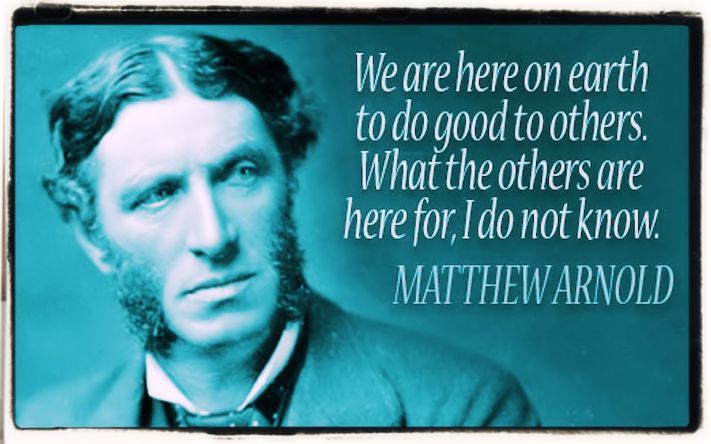
![]() Matthew Arnold (1822-1888) He was a famous poet and essayist of Victorian England. In his Essays in Criticism as well as in his other prose-writings Arnold tried to break down the prejudices of his countrymen, whose Anglo-Saxon element and “insularity” he disliked. He attacked the “Philistinism” of the English and their lack of concern for culture, believing that the latter had its root in the art and philosophy of ancient Greece. The classical qualities were exactly what the Englishmen needed if they wanted to attain harmonious perfection in morals and in literature. Arnold was, by profession, a school inspector, and his scholarly bent led him to deal also with education and religion. His Literature and Dogma develops his religious theory: according to him, man needed religion but religion had been spoilt by institutionalism and dogma and by the same materialization that had affected society and science. Its task and functions were therefore to be assumed by poetry.
Matthew Arnold (1822-1888) He was a famous poet and essayist of Victorian England. In his Essays in Criticism as well as in his other prose-writings Arnold tried to break down the prejudices of his countrymen, whose Anglo-Saxon element and “insularity” he disliked. He attacked the “Philistinism” of the English and their lack of concern for culture, believing that the latter had its root in the art and philosophy of ancient Greece. The classical qualities were exactly what the Englishmen needed if they wanted to attain harmonious perfection in morals and in literature. Arnold was, by profession, a school inspector, and his scholarly bent led him to deal also with education and religion. His Literature and Dogma develops his religious theory: according to him, man needed religion but religion had been spoilt by institutionalism and dogma and by the same materialization that had affected society and science. Its task and functions were therefore to be assumed by poetry.
Arnold is a romantic poet who did not wish to be one, an impossible conflict which maimed his poetic talent, and caused him finally to abandon poetry for literary criticism and prose prophecy. In fact from the middle 1850’s on, Arnold was primarily a prose writer. The purpose of his writings about religion was to purge religious belief of its traditional supernaturalism and the intellectual constructs that were based upon it, which must eventually distress a modern mind to alienate it from religion itself. In Arnold’s view, the essence of religion was simply a faith in the moral order of the universe; about that order no specific predications could be made. Religion was to be defined as “morality touched with emotion”; God was to be no more precisely conceived than as ” the power not ourselves that makes for righteousness”; the Bible was to be read as “literature” rather than as “dogma” – literature of the most moving kind, still communicating, in concepts and language not ours but nevertheless to be readily understood and deeply felt if properly read, the truths of the moral life. In their own day Arnold’s religious writings were widely popular among educated people who rejected much in traditional religion but who yet were reluctant to abandon all faith; with the disappearance of the situation that brought them into being, their interest is to be found only in the often brilliant imaginative sympathy with which Arnold speaks of the religious modes of the past.
Poetry is simply the most beautiful, impressive, and widely effective mode of saying things. Matthew Arnold
The future of poetry is immense, because in poetry, our race, as time goes on, will find an ever surer and surer stay.
Matthew Arnold
The pursuit of perfection, then, is the pursuit of sweetness and light.
Matthew Arnold
The true meaning of religion is thus, not simply morality, but morality touched by emotion.
Matthew Arnold
To have the sense of creative activity is the great happiness and the great proof of being alive.
Matthew Arnold
Truth sits upon the lips of dying men.
Matthew Arnold
Waiting for the spark from heaven to fall.
Matthew Arnold
A book must be an ice-axe to break the seas frozen inside our soul.
Franz Kafka
Books are not absolutely dead things, but do contain a potency of life in them….I know they are as lively and as vigorously productive as those fabulous dragon’s teeth and being sown up and down, may chance to spring up armed men.
John Milton
Ben Jonson: Politics? My play has nothing to do with politics. It’s just a simple comedy. Earl Of Oxford: All art is political, Jonson, otherwise it would just be decoration. And all artists have something to say, otherwise they’d make shoes. And you are not a cobbler, are you Jonson.
Anonymous 2011
